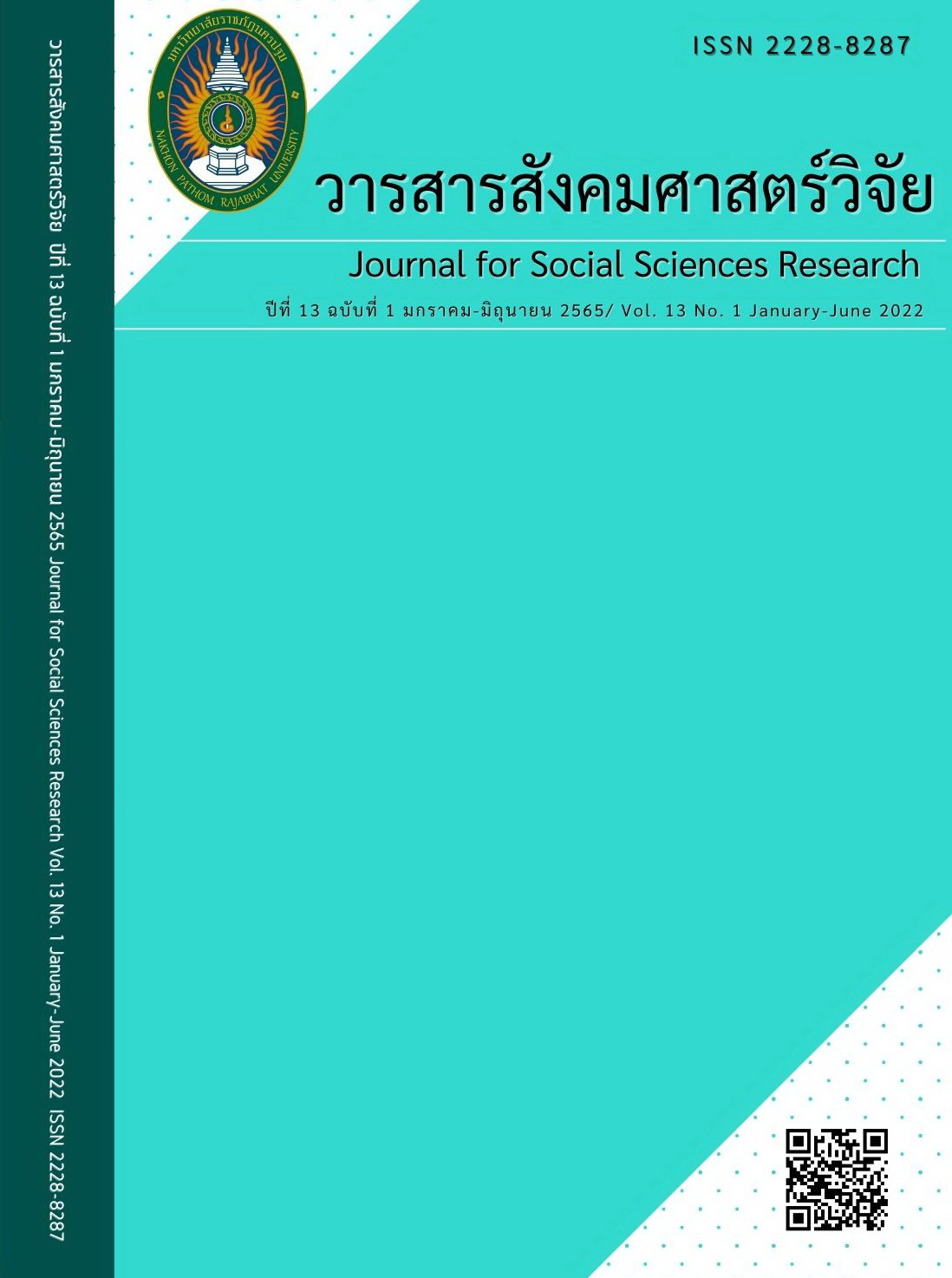PARTICIPATORY ADMINISTRATION AFFECTING EFFICIENCY OF EDUCATION DEVELOPMENT OF FACULTY OF EDUCATION, THAILAND NATIONAL SPORTS UNIVERSITY
Main Article Content
Abstract
The purposes of this research were to study: 1) the level of participatory administration and efficiency of education development; 2) the relationship between participatory administration and efficiency of education development; and 3) the factor of participatory administration and efficiency of education development in the Faculty of Education, Thailand National Sports University. The sample was 340 administrators, faculty members, and staff who involved in educational administration of the Faculty of Education, Thailand National Sports University. Krejcie & Morgan’s formula was used to determine the research sample size from each campus. The research instrument was a questionnaire. The statistics used for data analysis were frequency, percentage, mean, standard deviation, variance analysis, Pearson correlation coefficient, and stepwise multiple regression analysis.
The results were as follows:
- Overall and in specific aspects, the participatory administration of the Faculty of Education, Thailand National Sports University was found at a high level. The aspects in the descending order were participation in communication, participation in planning, participation in information, participation in control, participation in organization, and participation in organization leadership. Overall, the efficiency of educational development was at a high level. In the specific aspects, three aspects were at the highest level, namely, in the descending order, management, arts and culture preservation, folk games and Thai sports, and graduate production. Two aspects were at a high level, which consisted of academic services and research and innovation.
- Overall, the participatory administration had a positive relationship with the efficiency of educational development in the Faculty of Education, Thailand National Sports University at the statistically significant level of .01.
- The factors of participatory administration affecting the efficiency of educational development in the Faculty of Education, Thailand National Sports University consisted of participation in information (X5), participation in communication (X6), and participation in planning (X1) with the statistically significant level of .01. The participatory administration could predict the level of efficiency of educational development of the Faculty of the Education, Thailand National Sports University at the percentage of 67.90. The equation could be written as
tot = 392+ .296 X5 + .221 X6 + .122 X 1.
Article Details
บทความที่ได้รับการตีพิมพ์เป็นลิขสิทธิ์ของมหาวิทยาลัยราชภัฏนครปฐม
เนื้อหาของแต่ละบทความเป็นทัศนะของผู้เขียน ซึ่งที่ปรึกษา บรรณาธิการ กองบรรณาธิการ และคณะกรรมการบริหารวารสารไม่จำเป็นต้องเห็นด้วย หรือร่วมรับผิดชอบใดๆ
References
กนิษฐา สุขสมัย และประสพชัย พสุนนท์. (2558). การบริหารแบบมีส่วนร่วมของบุคลากรที่ส่งผลต่อประสิทธิภาพในการปฏิบัติงานของบุคลากรวิทยาลัยเทคโนโลยีสยาม. วารสารธุรกิจปริทัศน์, 7 (2), 9-25.
กรณัฏฐ์ สกุลกฤติ, ชญาพิมพ์ อุสาโห และพฤทธิ์ ศิริบรรณพิทักษ์. (2564). การบริหารสถาบันอุดมศึกษาเอกชนตามแนวคิดทักษะการทำงานในอนาคต. วารสารวิชาการมหาวิทยาลัยอีสเทิร์นเอเชีย, 11 (3), 127-141
นงลักษ์ จันหงษา, จิตติรัตน์ แสงเลิศอุทัย และนภาเดช บุญชูเดช. (2561). บทบาทของผู้บริหารสถานศึกษาที่ส่งผลต่อประสิทธิผลของโรงเรียนประถมศึกษาของรัฐในจังหวัดสมุทรสาคร. วารสารสังคมศาสตร์วิจัย, 9 (2), 46-65.
บรรลุ ชินน้ำพอง. (2555). สมรรถนะของผู้บริหารสถานศึกษาที่ส่งผลต่อประสิทธิผลของโรงเรียน สังกัดองค์การบริหารส่วนจังหวัดขอนแก่น. วิทยานิพนธ์ศึกษาศาสตรมหาบัณฑิต สาขาวิชาการบริหารสถานศึกษา บัณฑิตวิทยาลัย มหาวิทยาลัยขอนแก่น.
ปิรัญชนาถ เฮ่ประโคน และอารีย์ พินิจ. (2560). ความสัมพันธ์ระหว่างสวัสดิการการทำงานและประสิทธิภาพการทำงานของพนักงานธนาคารอาคารสงเคราะห์ในภาคตะวันออกเฉียงเหนือ. วารสารวิทยาลัยบัณฑิตศึกษาการจัดการ มหาวิทยาลัยขอนแก่น, 10 (1), 42-58.
พิศิษฐ ตัณฑวณิช และพนา จินดาศรี. (2561). ความหมายที่แท้จริงของค่า IOC. วารสารการวัดการศึกษา มหาวิทยาลัยมหาสารคาม, 24 (2), 3-12.
มหาวิทยาลัยการกีฬาแห่งชาติ. (2563). กฎหมายของมหาวิทยาลัยการกีฬาแห่งชาติ. ค้นเมื่อ 9 มิถุนายน 2563, จาก http://www.tnsu.ac.th/web/web3/index.php?option=com_content&view=article&id=805
เมตต์ การุณ์จิต. (2553). การบริหารจัดการศึกษาแบบมีส่วนร่วมประชาชน องค์กรปกครองส่วนท้องถิ่นและราชการ. กรุงเทพฯ: บุ๊คส์พอยท์.
โศภิดา คล้ายหนองสรวง. (2558). การบริหารแบบมีส่วนร่วมที่ส่งผลต่อประสิทธิผลของสถานศึกษา สังกัดสำนักงานเขตพื้นที่การศึกษาประถมศึกษาร้อยเอ็ด เขต 3. วิทยานิพนธ์การศึกษามหาบัณฑิต สาขาวิชาการบริหารการศึกษา คณะศึกษาศาสตร์ มหาวิทยาลัยบูรพา.
สำนักงานคณะกรรมการกิจการกระจายเสียง กิจการโทรทัศน์ และกิจการโทรคมนาคมแห่งชาติ. (2564). ค่านิยมหลักของคนไทย 12 ประการ. ค้นเมื่อ 10 กุมภาพันธ์ 2564, จาก https://www.nbtc.go.th /News/govnewspartner/ค่านิยมหลักของคนไทย-12-ประการ-ตามนโยบายของ-คสช.aspx
สำนักงานรับรองมาตรฐานและประเมินคุณภาพการศึกษา (องค์การมหาชน). (2555). รายงานประจำปี 2554 สำนักงานรับรองมาตรฐานและประเมินคุณภาพการศึกษา (องค์การมหาชน). กรุงเทพฯ: สำนักงานรับรองมาตรฐานและประเมินคุณภาพการศึกษา (องค์การมหาชน).
เสกสันต์ รอดย้อย. (2560). ความสัมพันธ์ระหว่างงานวิชาการของผู้บริหารสถานศึกษากับประสิทธิผลของสถานศึกษา สังกัดสำนักงานเขตพื้นที่การศึกษาประถมศึกษาพระนครศรีอยุธยา เขต 1. วารสารวิจัยราชภัฏกรุงเก่า, 4 (3), 25-32.
เสาวนีย์ เดือนเด่น และคณะ. (2558). รายงานการวิจัยเรื่อง การมีส่วนร่วมของบุคลากรกองบริการการศึกษา สำนักงานอธิการบดี มหาวิทยาลัยรามคำแหง. กรุงเทพฯ: มหาวิทยาลัยรามคำแหง.
อคิณ รพีพัฒน์. (2547). การมีส่วนร่วมของชุมชนในการพัฒนาชุมชนในสภาพสังคมและวัฒนธรรมไทย. นครปฐม: ศูนย์ศึกษานโยบายสาธารณสุข มหาวิทยาลัยมหิดล.
อโนทัย แทนสวัสดิ์. (2553). การพัฒนายุทธศาสตร์การบริหารจัดการเพื่อความเป็นเลิศของคณะครุศาสตร์/ศึกษาศาสตร์. วิทยานิพนธ์ครุศาสตรดุษฎีบัณฑิต สาขาวิชาอุดมศึกษา คณะครุศาสตร์ จุฬาลงกรณ์มหาวิทยาลัย.
อำภา สมันพืช. (2561). การมีส่วนร่วมในการบริหารกับความยึดมั่นผูกพันกับองค์การ ของครูในสถาบันการอาชีวศึกษา กรุงเทพมหานคร. วิทยานิพนธ์ศึกษาศาสตรมหาบัณฑิต สาขาวิชาบริหารการศึกษาและผู้นำทางการศึกษา คณะศึกษาศาสตร์ มหาวิทยาลัยสยาม.
Cohen, J. M. & Uphoff, N. T. (1980). Participations place in rural development: Seeking clarity through specificity. New York: World Developments.
Fornaroff, A. (1980). Community involvement in health system for primary health care. Geneva: World Health Organization.
Krejcie, R. V. & Morgan, D. W. (1970). Determining sample size for research activities. Educational and Psychological Measurement, 30, 607-610.
Sashkin, M. (1984). Participative management is an ethical imperative. Organization Dynamics, 12 (4), 5-22.
Sinlarat, P. (2019). Principle and foundation of tertiary education. Bangkok: Chulalongkorn University Press.


